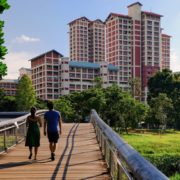
About Nella Sri Hendriyetty
Nella Hendriyetty is a senior capacity building and training economist at ADBI.COP26-aligned fiscal policy instruments for boosting Asian green growth, sustainable recovery
By Nella Sri Hendriyetty, Jacqueline Cottrell, Alexander Boden and Misuzu Nakamura. Posted October 5, 2021

The final months of 2021 will be a crucial time for climate policy. At the United Nations Climate Change Conference (COP26) in Glasgow from 31 October to 12 November, countries will need to come forward and show that they take the commitments that they made in Paris seriously and that they will reduce GHG emissions such that we reach net zero by 2050 to meet the climate targets of the Paris Agreement. Carbon pricing and other fiscal policies will play a critical role.
Social infrastructure to drive sustainable development in Asia beyond the pandemic

The coronavirus disease (COVID-19) pandemic discriminates in effect against the poor and the vulnerable, who have weaker immune systems and lack access to treatment and social support due to their economic status. The virus and social-isolation measures have caused a large increase in unemployment for lower-income segments of the population and depressed demand in industries with lower-income workers. It has been estimated that an additional 88 million–115 million people were plunged into extreme poverty in Asia in 2020, a figure that may rise to 150 million by the end of 2021 (Dartanto 2021: 7).
Taxation and digitalization in the COVID-19 era

The coronavirus disease (COVID-19) pandemic has created challenges for tax administrations and is constraining tax revenue in many countries. Its impacts have caused the global economy to slow down, leading to reduced tax collection. However, the pandemic has also changed social habits and encouraged people to use digital technologies.
E-learning to enhance capacities in Asia and the Pacific

The digital age poses both challenges and opportunities for many developing countries in Asia and the Pacific. In recent years, we have seen jobs in various sectors become obsolete. At the same time, we see new economic spaces being created demanding new skills and competencies. This also necessitates finding innovative ways to facilitate learning and to promote knowledge sharing, especially in the context of economic development.


Search
Subscribe / Connect to Asia Pathways
Subjects
- Accelerating Progress in Gender Equality
- Addressing Remaining Poverty and Reducing Inequality
- Agriculture and natural resources
- Capacity development
- Climate change
- Economics
- Education
- Energy
- Environment
- Finance and Innovation
- Finance sector development
- Gender
- Globalization and Economic Stability
- Governance and public sector management
- Health
- Industry and trade
- Information and Communications Technology
- Infrastructure
- Making Cities More Livable
- Miscellaneous
- Population
- Poverty
- Private sector development
- Regional cooperation and integration
- Sanitation
- Social development and protection
- Strengthening Governance and Institutional Capacity
- Subjects
- Transport
- Uncategorized
- Urban development
- Video Blog
- Water
Recent Posts
- From Crisis to Resilience: The Evolution of the Banking Sector in Asia and the Pacific
- Tariffs on the Table: What Could Be Asia’s Next Move?
- Investing in Childcare a Win for Women and the Economy
- Flush and Flourish: Upgraded Toilets Can Transform Lives in Rural Asia
- New Ways for Climate Finance and Development in Asia and the Pacific




Recent Comments